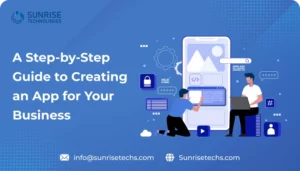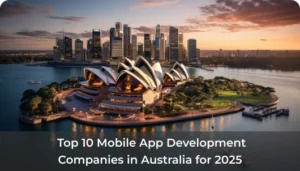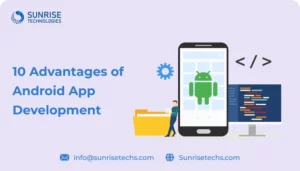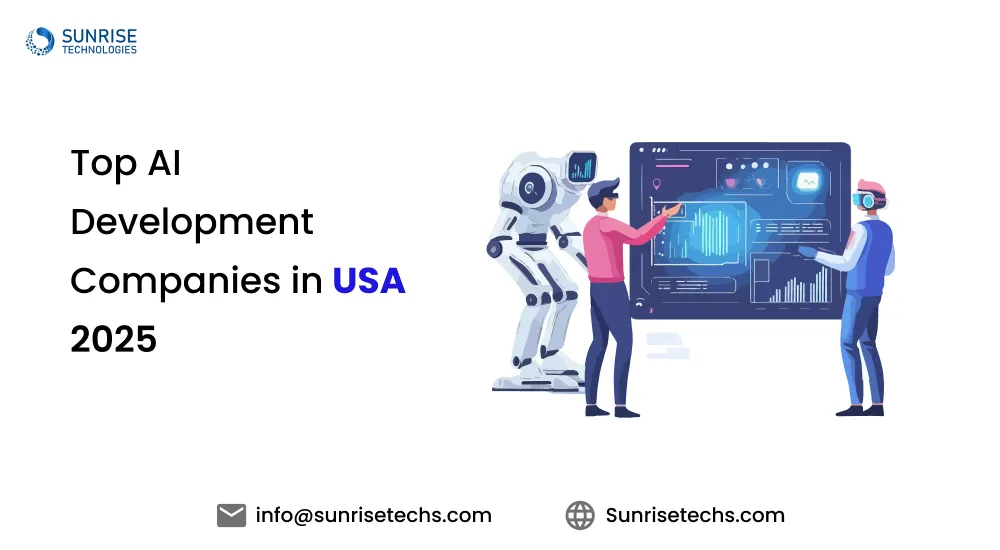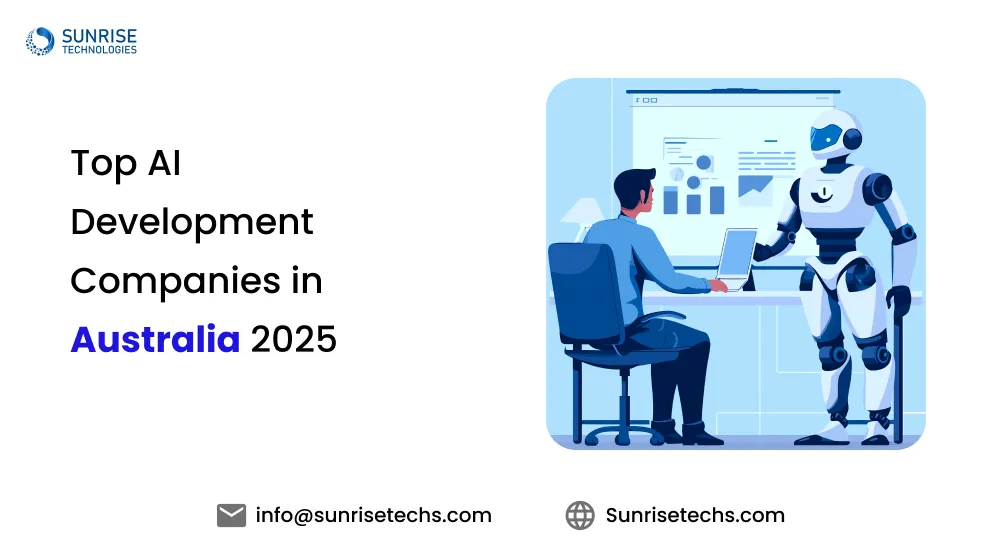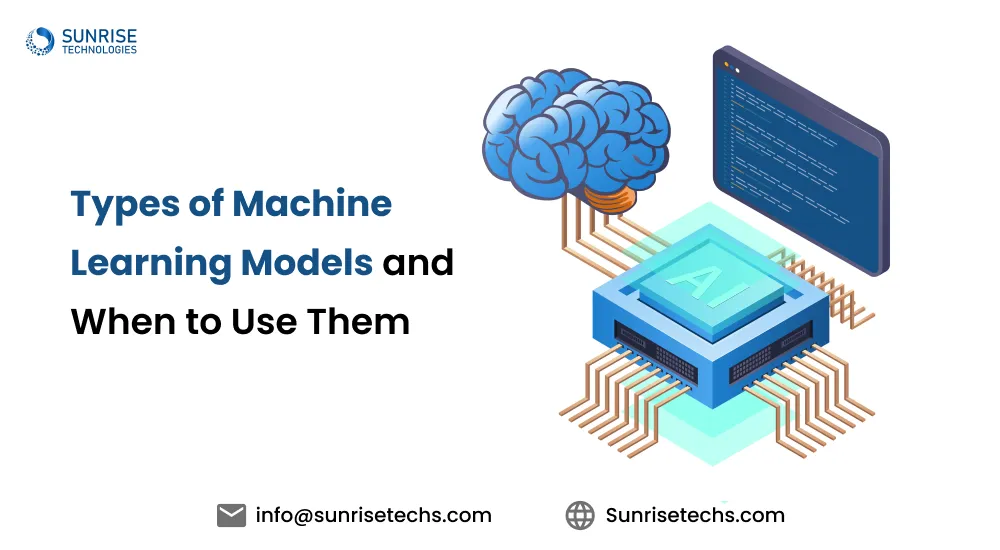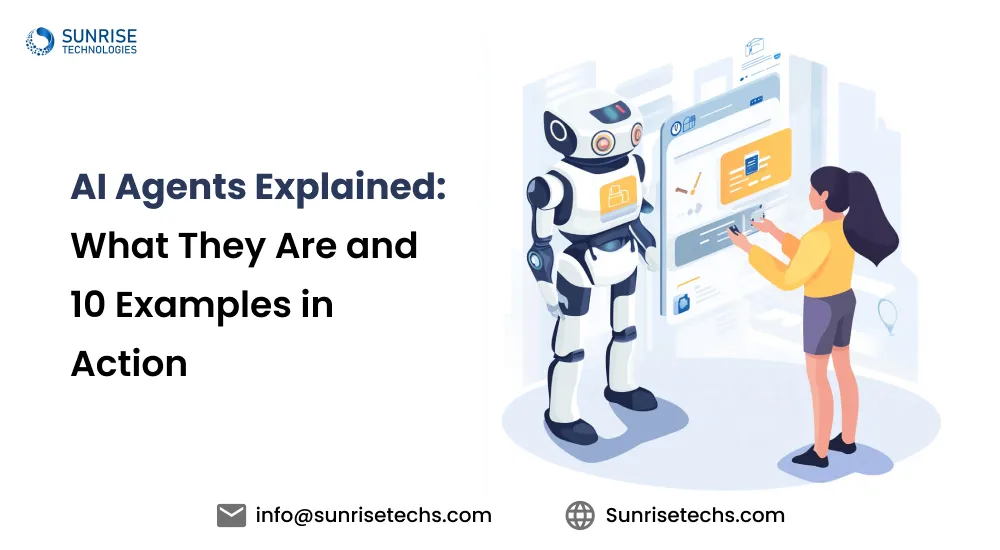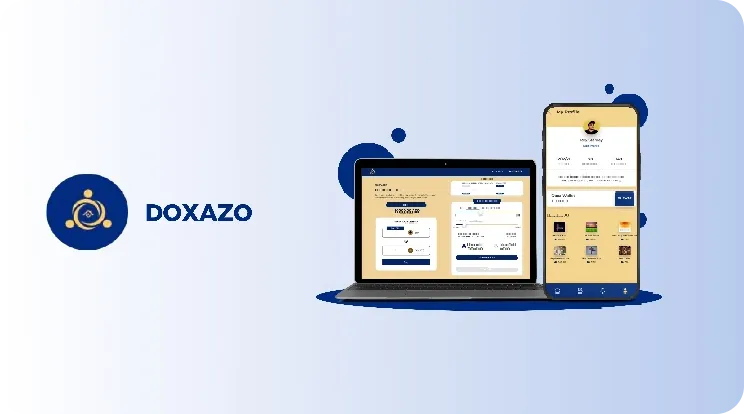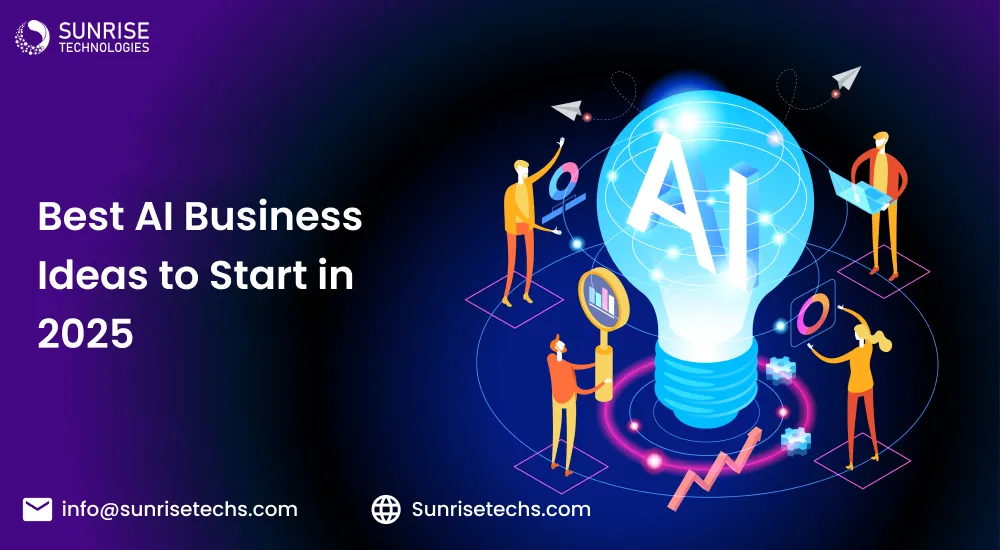
Best AI Business Ideas to Start in 2025
May 21, 2025
The year 2025 is shaping up to be a watershed moment for innovation, with Artificial Intelligence (AI) poised to revolutionize industries and create unprecedented entrepreneurial opportunities. If you’re an aspiring founder or entrepreneur looking to make your mark, now is the time to explore the exciting landscape of AI business idea in 2025.
This comprehensive guide dives into the best AI business ideas to start in 2025, offering not just generic concepts but informative and technically grounded insights to fuel your entrepreneurial vision. Let’s explore how you can leverage Future AI technologies to build a Profitable AI busi
Market Statistics:
The artificial intelligence industry is witnessing unprecedented growth, looking for AI startups 2025, and is the ideal time to launch an AI-driven venture.
- According to Statista, the global AI market is expected to skyrocket to $407 billion by 2027, driven by rapid advancements in machine learning, natural language processing, and computer vision technologies
- Even small businesses are jumping on the AI bandwagon, 61% of SMBs have already integrated at least one form of AI technology to enhance decision-making, customer service, or operational efficiency (Salesforce SMB Trends Report).
- 75% of global enterprises are actively planning to adopt AI-powered business models by 2025, signaling a massive shift toward intelligent automation and data-centric operations (IBM Global AI Adoption Index 2023).
Clearly, AI business ideas for startups and small businesses are no longer emerging trends, they’re foundational to future-proofing any modern enterprise.
Best AI Business Ideas to Start in 2025: Top 15
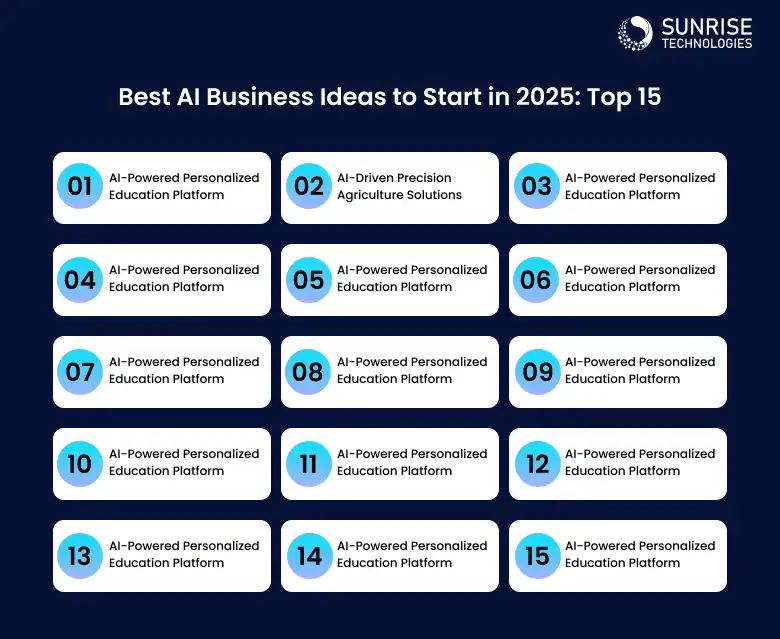
- 1. AI-Powered Personalized Education Platform
- 2. AI-Driven Precision Agriculture Solutions
- 3. AI-Enabled Healthcare Diagnostics and Prognostics
- 4. AI-Powered Cybersecurity Threat Intelligence
- 5. AI-Driven Supply Chain Optimization and Management
- 6. AI-Based Personalized Financial Advisory Services
- 7. AI-Powered Legal Tech for Document Review and Analysis
- 8. AI-Driven Content Creation and Marketing Automation
- 9. AI-Enabled Smart City Management Solutions
- 10. AI-Powered Environmental Sustainability Tools
- 11. AI-Driven Personalized Fitness and Wellness Coaching
- 12. AI-Based Accessibility Solutions for People with Disabilities
- 13. AI-Powered Customer Service and Support Automation
- 14. AI-Driven Talent Acquisition and HR Management
- 15. AI-Enabled Creative Tools for Art, Music, and Design
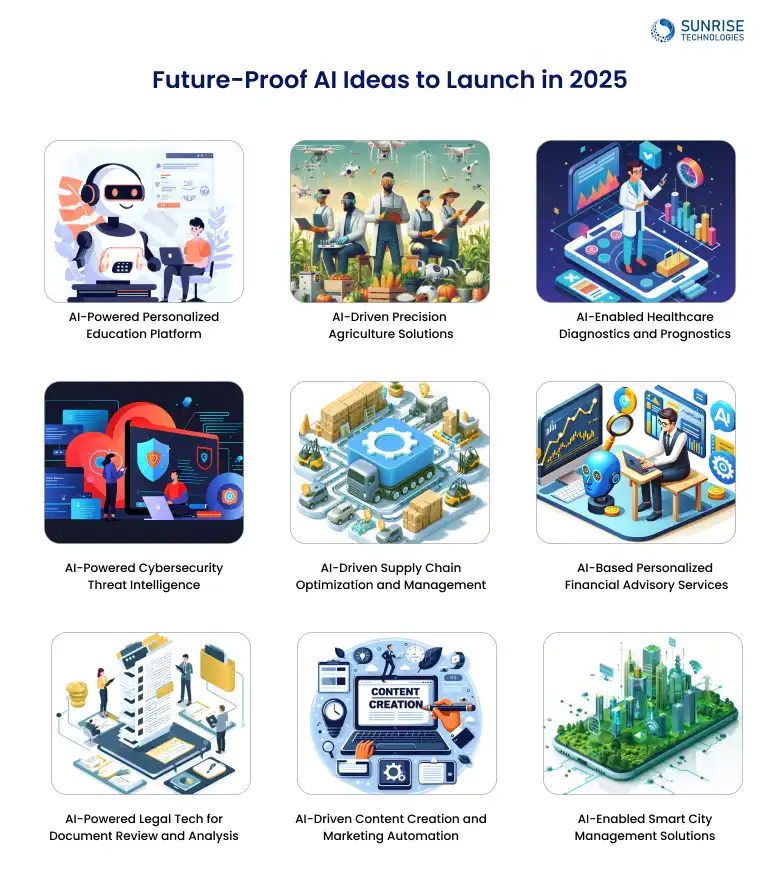
1. AI-Powered Personalized Education Platform:
In a world where traditional education models often fail to address individual needs, AI-powered personalized education platforms are transforming the way learners engage with knowledge. By analyzing each student’s strengths, weaknesses, learning pace, and preferences, these platforms offer tailor-made learning paths, turning every session into a uniquely crafted experience. From school classrooms to corporate training modules, personalized AI learning enables inclusive, adaptive, and result-oriented education for all.
Technical Concepts:
Under the hood, these platforms use machine learning, NLP, and real-time analytics to analyze student behavior and quiz performance. Reinforcement learning dynamically tweaks lesson flows, while models like GPT or BERT provide contextual explanations. Integration with Learning Management Systems (LMS) via APIs ensures seamless deployment. It’s scalable, flexible, and built for the future of EdTech.
Core Technologies Used:
- Machine Learning Frameworks: TensorFlow, PyTorch
- NLP Models: OpenAI GPT, Google BERT
- Recommendation Engines: Collaborative Filtering, Reinforcement Learning
- Analytics: Real-time student performance dashboards with tools like Power BI or Tableau
- Integrations: LMS platforms (Moodle, Blackboard), EdTech APIs
How It Benefits and Influences:
- Improves academic outcomes with targeted instruction
- Enhances student engagement and motivation
- Helps teachers focus on high-value tasks through AI support
- Promotes equity in education by personalizing content for diverse learning needs
- Supports lifelong learning by adapting across age groups and goals
Profitable Ways to Monetize:
- Subscription Models: Monthly/annual access for students and parents
- B2B Licensing: Sell to schools, colleges, and corporate training departments
- Freemium Plans: Offer free basic features with paid premium modules
- AI Tutoring Marketplace: Match students with AI-assisted tutors
- Custom Deployments: Build tailored solutions for educational institutions
2. AI-Driven Precision Agriculture Solutions:
Farming is getting a futuristic upgrade with AI in agriculture. Instead of relying solely on traditional methods, today’s farmers are turning to smart tools that analyze soil health, monitor crops in real time, and even predict the best time to harvest. It’s about farming that’s more efficient, sustainable, and profitable. Whether it’s detecting pests early or saving water through smart irrigation, AI is becoming a trusted ally on the field.
Technical Concepts:
These solutions integrate computer vision, IoT sensors, and satellite imaging to collect field data. Machine learning models process this data to identify patterns like moisture levels, pest infestations, or nutrient deficiencies. Platforms often run on edge devices (e.g., NVIDIA Jetson) for on-field processing and use TensorFlow or PyTorch for predictive analytics and yield forecasts.
How It Benefits and Influences:
- Increases yield and reduces input costs through data-driven decisions
- Enables early detection of pests and diseases to prevent crop loss
- Optimizes water usage via smart irrigation systems
- Empowers small-scale farmers with AI-driven mobile tools
Profitable Ways to Monetize:
- SaaS-based dashboards for agritech startups and cooperatives
- Subscription packages for AI-driven crop advisory services
- Sale of bundled AI + IoT hardware kits for smart farming
- B2B consulting for large farms and government agricultural programs
3. AI-Enabled Healthcare Diagnostics and Prognostics:
AI is transforming healthcare diagnostics with tools that can analyze medical images, electronic health records, and real-time patient data to offer faster and more accurate insights. So, if you want AI in detecting tumors on MRI scans or predicting ICU patient deterioration, AI is becoming a critical asset in medical decision-making.
Technical Concepts:
This solution uses deep learning techniques like convolutional neural networks (CNNs) for medical imaging, NLP models for extracting insights from electronic health records, and predictive models trained on clinical datasets for early detection and prognosis. Integration with hospital information systems (HIS) and telehealth platforms is often facilitated via custom APIs.
How It Benefits and Influences:
- Delivers early and accurate diagnosis for better treatment outcomes
- Enables remote diagnostics in rural or underserved areas
- Reduces diagnostic errors and clinician fatigue
- Personalizes treatment plans based on predictive analytics
Profitable Ways to Monetize:
- B2B partnerships with hospitals, clinics, and diagnostic labs
- SaaS platforms integrated with EHR systems
- Custom APIs for telehealth and digital health platforms
- Licensing AI models to medical device companies
4. AI-Powered Cybersecurity Threat Intelligence:
With rising cyber threats, traditional methods aren’t enough. AI-powered cybersecurity solutions analyze large volumes of data, detect anomalies, and respond to attacks in real time, proactively safeguarding networks, apps, and cloud infrastructure.
Technical Concepts:
These systems employ unsupervised machine learning for anomaly detection, supervised models for threat classification, and graph-based models like GNNs (Graph Neural Networks) for behavior analysis. Integration with SIEM (Security Information and Event Management) tools and endpoint protection platforms ensures real-time defense.
Profitable Ways to Monetize:
- Subscription-based SaaS platforms for SMBs and enterprises
- Managed Security Services Provider (MSSP) partnerships
- Custom integrations with existing cybersecurity stacks
- Enterprise licensing for global IT and security firms
Features:
- Content Generation: Generates blog posts, social media posts, product descriptions, and more.
- Tone & Style Customization: Mimics specific writing styles and brand voices for consistent content output.
- SEO Optimization: Built-in tools to optimize content for search engines.
- Language Support: Works with multiple languages to create global content.
5. AI-Driven Supply Chain Optimization and Management:
In a world of global commerce and rapid demand shifts, AI offers real-time visibility and optimization across the supply chain. From warehouse automation to last-mile delivery, it transforms operations into lean, agile systems.
Technical Concepts:
This solution leverages predictive analytics for demand forecasting, reinforcement learning for logistics routing, and digital twins for scenario simulations. Machine learning algorithms also optimize procurement, inventory, and transportation workflows. Integration with ERP systems and IoT sensors enables data-driven decisions at every level.
How It Benefits and Influences:
- Reduces logistics and warehousing costs
- Improves accuracy in demand and inventory forecasts
- Enhances agility during supply disruptions
- Boosts delivery speed and customer satisfaction
Profitable Ways to Monetize:
- SaaS platforms for supply chain and logistics firms
- Enterprise solutions integrated into ERP systems
- Data-as-a-Service offerings for market intelligence
- B2B consulting for digital supply chain transformation
6. AI-Based Personalized Financial Advisory Services
AI in finance is revolutionizing how individuals and businesses receive financial advice. By analyzing market trends, user behavior, and risk profiles, AI-powered platforms offer tailored financial plans and investment strategies for every customer. This shift from generic advice to hyper-personalized recommendations helps clients maximize returns and minimize risks in an ever-changing market landscape.
Technical Concepts:
This solution uses machine learning for portfolio optimization, natural language processing (NLP) for customer interaction, and reinforcement learning for dynamic risk profiling. Integration with APIs of financial institutions and market data streams enables real-time updates and personalized insights. Tools like TensorFlow and PyTorch power the algorithms that drive predictive analytics and forecasting.
How It Benefits and Influences:
- Offers 24/7 personalized financial advice
- Minimizes human bias in financial decisions
- Provides real-time updates based on market conditions
- Enhances financial literacy and planning for users
Profitable Ways to Monetize:
- Subscription-based fintech apps for individuals
- API licensing to banks and wealth management firms
- B2B solutions for insurance companies and financial institutions
- Partnership opportunities with investment platforms for white-label solutions
7. AI-Powered Legal Tech for Document Review and Analysis
AI is transforming legal workflows, making document review faster, more accurate, and cost-effective. From contract analysis to risk identification, AI solutions are streamlining legal processes and allowing firms to handle large volumes of documents with ease. By understanding legal language and detecting patterns, AI tools help legal teams reduce errors and accelerate decision-making.
Technical Concepts:
Leveraging Natural Language Processing (NLP) models like LegalBERT and GPT, AI-driven legal tech scans and analyzes legal documents. These tools can flag risks, highlight key clauses, and even automate contract drafting. Machine learning algorithms improve as they learn from past document reviews, while document clustering and entity recognition enhance precision.
How It Benefits and Influences:
- Speeds up the contract review process
- Reduces human errors in legal analysis
- Enhances risk management by flagging potential issues early
- Cuts down on legal overheads, saving time and resources
Profitable Ways to Monetize:
- Subscription models for law firms
- Custom deployments for corporate legal departments
- Marketplace for legal document templates and review tools
- White-label solutions for legal tech platforms
8. AI-Driven Content Creation and Marketing Automation
AI is reshaping digital marketing by automating the creation of blogs, social media posts, emails, and even videos. With the help of AI, content creation is more efficient, personalized, and data-driven. These AI-powered tools can analyze user preferences and create high-engagement content that boosts brand visibility and conversion rates.
Technical Concepts:
Generative AI models like GPT and DALL·E power content generation, while NLP and sentiment analysis optimize messaging for different audiences. AI-driven marketing automation tools for startups enhances automation tools that leverage machine learning algorithms to schedule content, track performance, and adjust strategies in real-time. Integrating with tools like HubSpot, Marketo, and Google Analytics provides a seamless and scalable content management system.
How It Benefits and Influences:
- Automates content creation at scale
- Personalizes messages to engage targeted audiences
- Enhances marketing efficiency with optimized scheduling
- Provides valuable insights into content performance
Profitable Ways to Monetize:
- SaaS platforms for content automation tools
- White-label solutions for digital marketing agencies
- Premium subscription models for content optimization features
- API integration for e-commerce platforms and CRM systems
9. AI-Enabled Smart City Management Solutions
AI is taking urban planning and management to new heights by integrating smart systems for traffic, energy, security, and environmental monitoring. These solutions create safer, more efficient cities by predicting trends, optimizing resource allocation, and improving urban mobility. AI-powered smart cities are paving the way for the future of sustainable urban living.
Technical Concepts:
Smart city solutions use AI algorithms like reinforcement learning for traffic optimization and predictive analytics for energy usage forecasting. Machine learning models analyze data from IoT sensors installed across cities, enabling real-time decision-making for urban planning. Digital twins simulate scenarios, helping city planners optimize resources and respond to emerging challenges.
How It Benefits and Influences:
- Reduces traffic congestion and energy waste
- Improves public safety with predictive policing
- Optimizes waste management and resource allocation
- Enhances citizen engagement through real-time services
Profitable Ways to Monetize:
- SaaS platforms for city governments and municipalities
- B2B solutions for smart infrastructure providers
- Data-as-a-Service for urban analytics
- Public-private partnerships for smart city deployments
10. AI-Powered Environmental Sustainability Tools
AI is playing a pivotal role in creating solutions for environmental sustainability. From tracking carbon emissions to optimizing resource usage, AI tools help businesses and governments monitor and reduce their environmental impact. By analyzing vast amounts of environmental data, AI can suggest actionable steps to reduce waste, lower emissions, and promote green practices.
Technical Concepts:
AI solutions employ machine learning models to analyze environmental data from sensors and satellites, providing insights into energy consumption, waste management, and resource optimization. Predictive analytics models forecast environmental impact based on current trends, and reinforcement learning optimizes processes for minimal environmental footprint.
How It Benefits and Influences:
- Reduces carbon emissions and resource wastage
- Enhances environmental compliance with real-time monitoring
- Optimizes supply chains for sustainability
- Promotes eco-friendly practices for businesses and consumers
Profitable Ways to Monetize:
- Subscription AI business models for sustainability platforms
- B2B consulting for companies aiming to reduce their carbon footprint
- Data analytics services for environmental monitoring
- Partnerships with government bodies for policy-driven sustainability initiatives
11. AI-Driven Personalized Fitness and Wellness Coaching
AI is revolutionizing the fitness and wellness industry by offering hyper-personalized coaching to users. Leveraging data from wearables, fitness apps, and personal preferences, AI-driven sports platforms create customized fitness plans, track progress, and provide real-time feedback. With AI’s ability to analyze and adapt, individuals get tailored workouts, nutritional guidance, and wellness routines that evolve as they progress.
Technical Concepts:
Machine learning models analyze data from fitness trackers and health apps to offer insights into user performance. AI algorithms incorporate predictive analytics for goal setting, while reinforcement learning adapts the program based on the user’s progress and preferences. Natural language processing (NLP) models power virtual fitness coaches, providing conversational support through mobile apps.
How It Benefits and Influences:
- Delivers customized fitness plans based on user data
- Provides real-time feedback for optimal workout results
- Tracks progress to refine routines and enhance motivation
- Helps users meet wellness goals more efficiently
Profitable Ways to Monetize:
- Subscription-based apps for personalized fitness plans
- Integration with wearable fitness devices for premium features
- B2B solutions for gyms and wellness centers
- Partnering with health insurance companies for wellness incentives
12. AI-Based Accessibility Solutions for People with Disabilities
AI is transforming how people with disabilities interact with the world by providing innovative accessibility solutions. Whether it’s through speech recognition, image captioning, or navigation assistance, AI-based tools are breaking down barriers and empowering individuals with disabilities to lead more independent lives.
Technical Concepts:
AI solutions like NLP for voice-activated commands, computer vision for object recognition, and real-time translation tools improve communication for people with disabilities. Machine learning algorithms also enhance personalized support by learning individual needs and preferences, enabling adaptive interfaces and assistive technologies. AI-powered applications are integrated with smart devices to create more inclusive environments.
How It Benefits and Influences:
- Enhances independence for people with disabilities
- Improves accessibility in both physical and digital spaces
- Fosters inclusion through adaptive technologies
- Provides real-time assistance for various disabilities
Profitable Ways to Monetize:
- Subscription models for accessibility apps and tools
- Partnerships with assistive technology hardware providers
- B2B solutions for organizations aiming to improve accessibility
- Government and NGO collaborations for public sector deployments
13. AI-Powered Customer Service and Support Automation
AI is reshaping customer service by automating support tasks, improving response times, and enhancing customer experiences. From chatbots to virtual assistants, AI-driven platforms provide 24/7 support across various channels, resolving queries and troubleshooting issues without human intervention. These solutions ensure a seamless and efficient customer journey while reducing operational costs.
Technical Concepts:
Natural language processing (NLP) and machine learning algorithms power chatbots and virtual assistants, enabling them to understand and respond to customer queries. These systems use supervised learning to refine responses, while sentiment analysis models assess customer emotions to provide contextually appropriate solutions. Integration with CRM systems enables AI to offer personalized support.
How It Benefits and Influences:
- Automates customer service tasks, reducing operational costs
- Provides fast, 24/7 support to customers globally
- Enhances customer satisfaction with accurate and timely responses
- Improves support efficiency by handling high volumes of queries
Profitable Ways to Monetize:
- SaaS platforms for customer service automation
- Licensing AI-powered chatbots to e-commerce businesses
- B2B solutions for call centers and customer support departments
- White-label support automation tools for CRM platforms
14. AI-Driven Talent Acquisition and HR Management
AI is streamlining talent acquisition and AI in hiring by automating candidate sourcing, screening, and employee engagement. AI tools help organizations identify the best talent, reduce biases, and ensure a smoother recruitment process, while HR management tools enhance employee experiences and retention.
Technical Concepts:
Machine learning algorithms analyze resumes, job descriptions, and candidate profiles to match the best candidates to roles. Predictive analytics models forecast employee performance and cultural fit. NLP models help in sentiment analysis during interviews or surveys, while reinforcement learning helps optimize HR processes based on employee feedback.
How It Benefits and Influences:
- Accelerates recruitment with AI-driven candidate matching
- Reduces human biases in hiring decisions
- Improves employee retention with data-driven HR insights
- Enhances employee engagement with personalized HR tools
Profitable Ways to Monetize:
- B2B subscription services for recruitment and HR management tools
- White-label AI solutions for HR departments
- Premium offerings for employee engagement and performance analysis
- Consulting services for enterprises looking to integrate AI into HR
15. AI-Enabled Creative Tools for Art, Music, and Design
AI is pushing the boundaries of creativity by offering tools that aid in the creation of art, music, and designs. With AI’s ability to generate unique pieces of work, it empowers artists, designers, and musicians to explore new possibilities and enhance their creative processes, making artistic creation more accessible and efficient for AI in media and entertainment
Technical Concepts:
Generative adversarial networks (GANs) and deep learning models are used to generate art and music, while AI tools assist in design by offering creative suggestions or optimizing layouts. Machine learning algorithms analyze artistic styles and trends, allowing AI to produce works that align with user preferences. AI-based tools also assist with content refinement and iteration in design.
How It Benefits and Influences:
- Speeds up the creative process by automating routine tasks
- Unlocks new artistic possibilities with AI-generated content
- Enhances creativity with personalized design suggestions
- Makes high-quality creative tools accessible to everyone
Profitable Ways to Monetize:
- Subscription services for AI-powered creative software
- Licensing AI-generated art and music for commercial use
- B2B solutions for advertising and design agencies
- Custom AI-powered design and art generation tools for clients
Explore the top ideas and find your perfect starting point. Begin your entrepreneurial AI journey with us.
How Entrepreneurs Can Launch an AI Startup from Scratch
Embarking on an AI startup, and looking for the best AI startup ideas in USA may seem daunting, but a structured approach can ease the journey. Here’s a step-by-step guide for new entrepreneurs to launch AI startup:
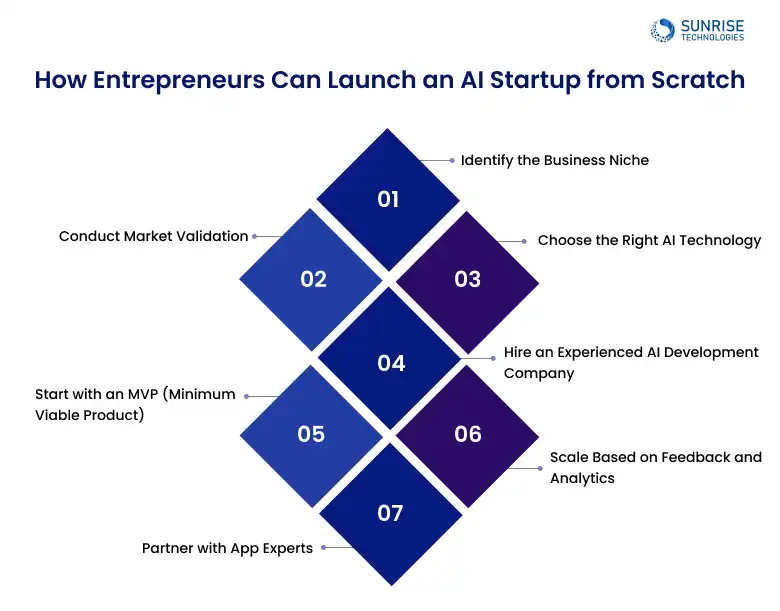
- 1.Identify the Business Niche: Choose a domain where AI can genuinely add value, be it healthcare, education, retail, etc.
- 2.Conduct Market Validation: Use surveys, interviews, and trend analysis to ensure there’s real demand and a pain point to solve.
- 3. Choose the Right AI Technology: Depending on your product, opt for the right tech like Natural Language Processing (NLP), Computer Vision (CV), Machine Learning (ML), etc.
- 4. Hire an Experienced AI Development Company: Partner with experts who can transform your idea into a scalable AI solution.
- 5. Start with an MVP (Minimum Viable Product): Build a simplified version to test core functionality and user interest.
- 6. Scale Based on Feedback and Analytics: Improve and expand your solution using real user data and iterative updates.
- 7. Partner with App Experts
How Much Does It Cost to Develop an AI App?
The cost of developing an AI app varies depending on its complexity, features, and integration needs. In building a simple chatbot or a full-scale AI platform, here’s a general breakdown:
| AI App Complexity | Estimated Cost Range | Key Features |
|---|---|---|
| Basic AI App | $15,000 – $40,000 | Simple chatbot, basic recommendations, minimal UI |
| Mid-Level AI App | $40,000 – $100,000 | Custom ML models, user profiles, integrations, data processing |
| Enterprise AI App | $100,000 – $300,000+ | Scalable architecture, advanced AI/ML, analytics, cloud support |
Key Factors Influencing AI App Development Costs
Before investing, it’s crucial to understand the core factors impacting your AI app budget, so you can plan smart, build efficiently, and scale wisely.
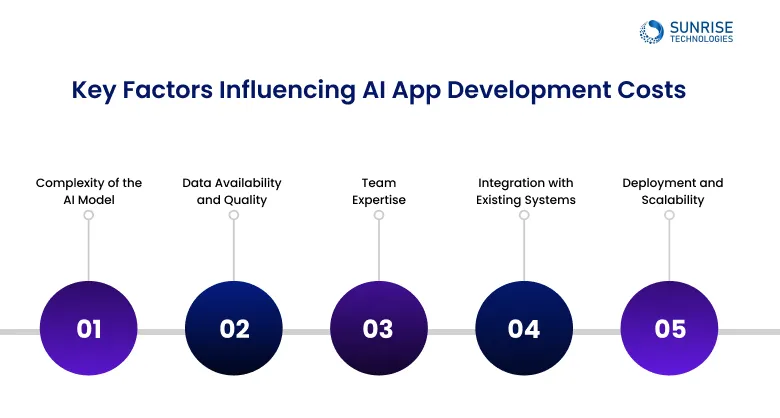
The cost varies significantly between simple rule-based models and custom-trained deep learning architectures tailored to unique business logic.
High-quality, well-labeled datasets are crucial. Costs rise if significant effort is needed for data collection, cleaning, and annotation.
Hiring seasoned AI specialists, data scientists, and MLOps engineers can impact the budget, but ensures robust and scalable solutions.
Seamless AI integration with legacy systems, APIs, CRMs, or IoT platforms requires additional effort and testing, affecting cost and timelines.
Cloud-based deployments (AWS, Azure, GCP) offer scalability and flexibility, while on-premise setups demand more upfront infrastructure investment.
Our team has the expertise to take your business to new heights. Let’s build a custom AI solution for you!
How to Reduce Development Costs in AI Startups
By leveraging the right tools, talent, and strategies, startups can build powerful AI solutions while keeping development costs under control.
Leverage platforms like Hugging Face, TensorFlow, or PyTorch to cut down on initial development time and licensing costs.
Collaborating with seasoned experts reduces trial-and-error and accelerates time-to-market with optimized architecture and models.
Platforms like Bubble, Retool, or Lobe.ai allow quick prototyping and MVP development with minimal coding effort.
Utilize public datasets (like Kaggle, OpenML, UCI) instead of investing heavily in collecting and labeling new data.
Most cloud providers offer startup credits, take advantage of AWS Activate, Google Cloud for Startups, or Microsoft for Startups to minimize infrastructure costs.
Future AI Trends Impacting Business in 2025 and Beyond
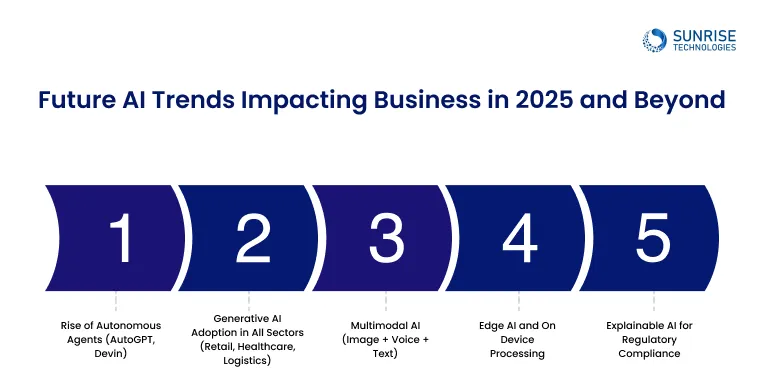
As AI evolves, autonomous agents like AutoGPT and Devin will revolutionize decision-making, automating tasks across industries while reducing human error and operational costs.
From personalized shopping experiences to predictive healthcare solutions and optimized supply chains, generative AI will become ubiquitous, driving innovation across all sectors.
The convergence of AI models that understand and respond through multiple forms of input like image, voice, and text, will create seamless, intuitive user experiences and drive smarter, more versatile systems.
Moving AI computations to the edge will reduce latency, lower costs, and provide real-time decision-making capabilities without the need for constant cloud connectivity, empowering industries with immediate insights.
With AI’s growing role in decision-making, explainable AI (XAI) will become crucial to ensure transparency, trust, and adherence to legal regulations, making AI models more understandable and accountable.
Why Choose Sunrise Technologies?
Sunrise Technologies stands out as a top app development company in Australia and USA, renowned for its innovative solutions and expertise in AI development. As the best AI development company in both regions, we specialize in crafting cutting-edge custom AI-powered apps for startups and enterprises alike. So, in launching your AI app for a startup or enterprise-grade AI solutions, our team’s deep technical knowledge ensures a seamless and scalable experience from concept to deployment.
With a proven track record of success in transforming ideas into actionable AI solutions, Sunrise Technologies is your trusted partner in navigating the ever-evolving tech landscape. Our commitment to quality, innovation, and customer satisfaction makes us the ideal choice for businesses ready to harness the full potential of AI in today’s competitive market.
Endnote:
The future of business is driven by AI, and as we move towards 2025, companies across the globe are embracing AI solutions to gain a competitive edge. From autonomous agents and generative AI to multimodal AI and edge computing, the rise of intelligent systems is reshaping industries like never before.
Businesses, both startups and enterprises, are seeking reliable partners who not only understand the complexities of AI but also provide the scalability, security, and efficiency required to deliver innovative, data-driven solutions.
Hand over your project or ideas to a trusted AI app development service like Sunrise Technologies, where expertise meets innovation to bring your AI vision to life.
With deep industry knowledge and technical expertise, we build powerful apps that drive innovation and growth.
Some of the best AI business ideas include virtual assistants, AI-driven analytics, content generation tools, and smart security systems.
Subscription-based AI SaaS platforms, such as AI marketing tools and customer service bots, are among the most profitable models in 2025 due to their scalability and recurring revenue potential. To maximize the effectiveness of these models, it’s essential to partner with a top app development company like Sunrise Technologies for expert guidance and implementation.
Yes, chatbot development, AI writing tools, and predictive analytics platforms are low-investment AI startup ideas that require minimal infrastructure.
Costs range from $15,000 for a basic MVP to $100,000+ for a custom AI business model depending on complexity and team structure.
Edge AI, multimodal AI, and AI-powered research tools are trending as emerging AI opportunities for tech
Sam is a chartered professional engineer with over 15 years of extensive experience in the software technology space. Over the years, Sam has held the position of Chief Technology Consultant for tech companies both in Australia and abroad before establishing his own software consulting firm in Sydney, Australia. In his current role, he manages a large team of developers and engineers across Australia and internationally, dedicated to delivering the best in software technology.
